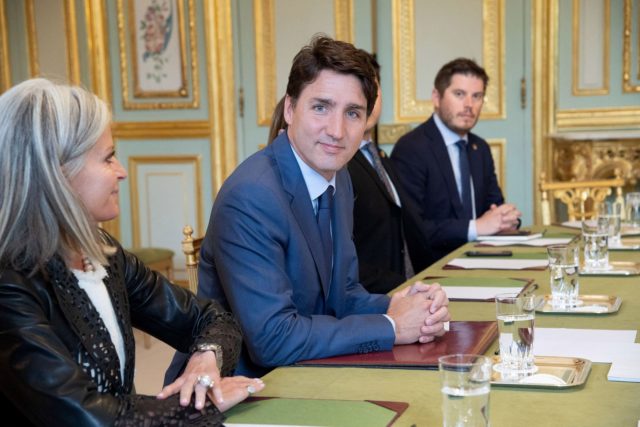
Trudeau invokes never-before-used emergency power against COVID mandate protesters Canadian Prime Minister Justin Trudeau attends a meeting with French president Emmanuel Macron at the Elysee Palace in Paris, on June 7, 2019. (Pierre Villard/Pool/Abaca Press/TNS)
Canadian Prime Minister Justin Trudeau invoked the never-before-used Emergencies Act on Monday in response to the “Freedom Convoy” COVID-19 mandate protesters, who have vowed to keep the demonstration going until all pandemic-related restrictions are lifted.
“The federal government has invoked the Emergencies Act to supplement provincial and territorial capacity to address the blockades and occupations,” Trudeau said on Monday.
NOW – PM Trudeau invokes the Emergencies Act, the successor to the War Measures Act, to quell protests in Canada. pic.twitter.com/9LcMjj2i8x
— Disclose.tv (@disclosetv) February 14, 2022
According to the CBC, sources said Trudeau informed officials throughout Canada of his decision Monday morning, prompting multiple premiers to condemn the move.
“The illegal blockades must end, but police already have sufficient tools to enforce the law and clear the blockades, as they did over the weekend in Windsor,” tweeted Saskatchewan Premier Scott Moe. “Therefore, Saskatchewan does not support the Trudeau government invoking the Emergencies Act. If the federal government does proceed with this measure, I would hope it would only be invoked in provinces that request it, as the legislation allows.”
Therefore, Saskatchewan does not support the Trudeau government invoking the Emergencies Act.
If the federal government does proceed with this measure, I would hope it would only be invoked in provinces that request it, as the legislation allows.
[2/2]— Scott Moe (@PremierScottMoe) February 14, 2022
Canada’s Emergencies Act defines a national emergency as a temporary “urgent and critical situation” that “seriously endangers the lives, health or safety of Canadians and is of such proportions or nature as to exceed the capacity or authority of a province to deal with it.”
The act allows the cabinet to “take special temporary measures that may not be appropriate in normal times.”
In order to invoke the Emergencies Act, the government must demonstrate that a state of emergency exists, explained Jack Lindsay, an associate professor in the applied disaster and emergency studies department at Brandon University in Manitoba.
“They’re gonna have to basically prove that first hurdle, that it is a national emergency,” Lindsay said. “He’s basically going to be arguing that these truckers are basically creating a threat to the security of Canada.”
While the government is blocked from taking control of local police, Lindsay said the act would allow government to order any individual to provide services with pay, which could theoretically be used to force tow truck drivers to move the trucks being used in the demonstration.
“They do have the grounds to regulate and prohibit public assembly and travel and then regulate or prohibit the use of specific properties,” he said. “I suppose they could put out regulations about where semi-trailers are allowed to park overnight, for example. They can designate protected places, like the Ambassador Bridge or something.”
Leah West, who authored a book on national security law, said she has concerns about invoking “the most powerful federal law” Canada has.
“To invoke a national emergency, the government would need to be saying that these protests threaten the security of Canada, our sovereignty or our territorial integrity,” West said. “I have real concerns about fudging the legal thresholds to invoke the most powerful federal law that we have.”
Quebec Premier Francois Legault also voiced his opposition to Trudeau’s decision, the Montreal Gazette reported.
“We do not wish to have a state of emergency in Quebec. It’s not necessary and it’s time to bring together not divide,” Legault said.
Some are equating Canada’s Emergencies Act with “martial law,” which allows government to use military force to control civilian populations.
“BREAKING: Trudeau has updated his schedule, and will likely invoke martial law at 4:30 local time. Military officials have been consulted by Trudeau’s staff,” journalist Keean Bexte tweeted.
BREAKING: Trudeau has updated his schedule, and will likely invoke martial law at 4:30 local time. Military officials have been consulted by Trudeau's staff. pic.twitter.com/cePykqV5km
— Keean Bexte (@TheRealKeean) February 14, 2022
“When given a choice between rescinding ridiculous vaccine mandates upon truckers at the border and invoking a form of Martial law, Trudeau chose Martial law,” tweeted columnist Cory Morgan.
When given a choice between rescinding ridiculous vaccine mandates upon truckers at the border and invoking a form of Martial law, Trudeau chose Martial law.
— Cory Morgan (@CoryBMorgan) February 14, 2022
Last week, President Joe Biden’s administration urged Trudeau to use governmental powers to end the peaceful trucker demonstration protesting COVID-19 vaccine mandates after the group blockaded the Ambassador Bridge connecting the U.S. and Canada.
Reports said Homeland Security Secretary Alejandro Mayorkas and Transportation Secretary Pete Buttigieg spoke with their Canadian counterparts and insisted the Canadian federal government shut down the peaceful protest.




